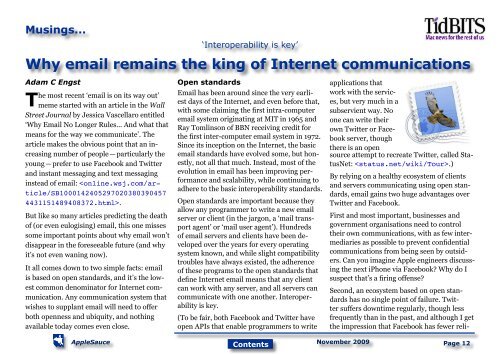AppleSauce, December 2009 - South Australian Apple Users' Club
AppleSauce, December 2009 - South Australian Apple Users' Club
AppleSauce, December 2009 - South Australian Apple Users' Club
Create successful ePaper yourself
Turn your PDF publications into a flip-book with our unique Google optimized e-Paper software.
Musings...<br />
‘Interoperability is key’<br />
Why email remains the king of Internet communications<br />
Adam C Engst<br />
The most recent ‘email is on its way out’<br />
meme started with an article in the Wall<br />
Street Journal by Jessica Vascellaro entitled<br />
‘Why Email No Longer Rules... And what that<br />
means for the way we communicate’. The<br />
article makes the obvious point that an increasing<br />
number of people — particularly the<br />
young — prefer to use Facebook and Twitter<br />
and instant messaging and text messaging<br />
instead of email: .<br />
But like so many articles predicting the death<br />
of (or even eulogising) email, this one misses<br />
some important points about why email won’t<br />
disappear in the foreseeable future (and why<br />
it’s not even waning now).<br />
It all comes down to two simple facts: email<br />
is based on open standards, and it’s the lowest<br />
common denominator for Internet communication.<br />
Any communication system that<br />
wishes to supplant email will need to offer<br />
both openness and ubiquity, and nothing<br />
available today comes even close.<br />
Open standards<br />
Email has been around since the very earliest<br />
days of the Internet, and even before that,<br />
with some claiming the first intra-computer<br />
email system originating at MIT in 1965 and<br />
Ray Tomlinson of BBN receiving credit for<br />
the first inter-computer email system in 1972.<br />
Since its inception on the Internet, the basic<br />
email standards have evolved some, but honestly,<br />
not all that much. Instead, most of the<br />
evolution in email has been improving performance<br />
and scalability, while continuing to<br />
adhere to the basic interoperability standards.<br />
Open standards are important because they<br />
allow any programmer to write a new email<br />
server or client (in the jargon, a ‘mail transport<br />
agent’ or ‘mail user agent’). Hundreds<br />
of email servers and clients have been developed<br />
over the years for every operating<br />
system known, and while slight compatibility<br />
troubles have always existed, the adherence<br />
of these programs to the open standards that<br />
define Internet email means that any client<br />
can work with any server, and all servers can<br />
communicate with one another. Interoperability<br />
is key.<br />
(To be fair, both Facebook and Twitter have<br />
open APIs that enable programmers to write<br />
By relying on a healthy ecosystem of clients<br />
and servers communicating using open standards,<br />
email gains two huge advantages over<br />
Twitter and Facebook.<br />
First and most important, businesses and<br />
government organisations need to control<br />
their own communications, with as few intermediaries<br />
as possible to prevent confidential<br />
communications from being seen by outsiders.<br />
Can you imagine <strong>Apple</strong> engineers discussing<br />
the next iPhone via Facebook? Why do I<br />
suspect that’s a firing offense?<br />
Second, an ecosystem based on open standards<br />
has no single point of failure. Twitter<br />
suffers downtime regularly, though less<br />
frequently than in the past, and although I get<br />
the impression that Facebook has fewer reliapplications<br />
that<br />
work with the services,<br />
but very much in a<br />
subservient way. No<br />
one can write their<br />
own Twitter or Facebook<br />
server, though<br />
there is an open<br />
source attempt to recreate Twitter, called StatusNet:<br />
.)<br />
November <strong>2009</strong><br />
<strong><strong>Apple</strong>Sauce</strong> Page 12<br />
Contents






